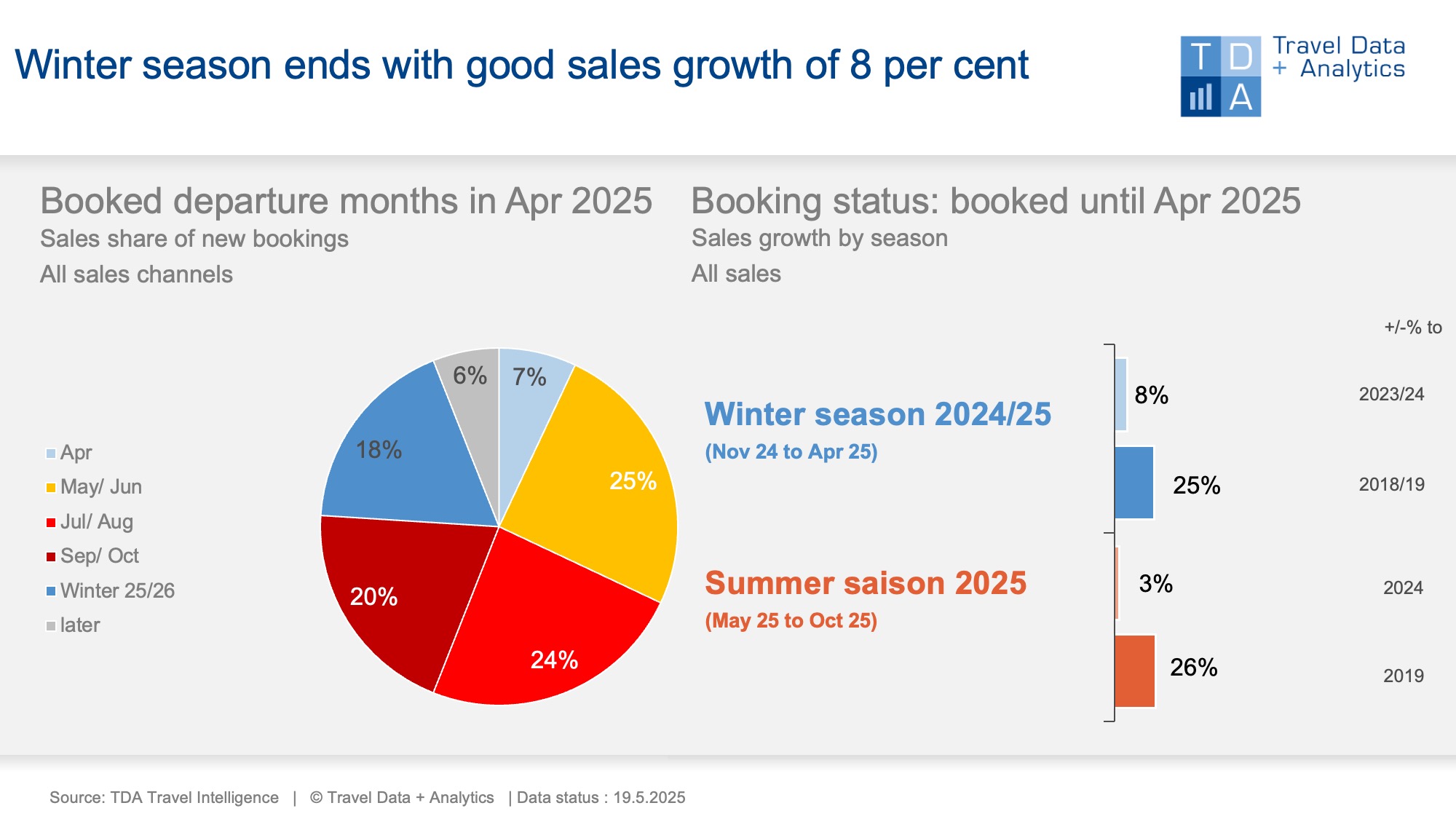Nuremberg, May 29, 2025 – In April 2025, incoming bookings for holidays in the tour operator market were relatively disappointing with a year-on-year decline of 12 per cent. A drop of 17 per cent for summer business means that the cumulative sales balance for the 2025 summer season fell by a full 4 percentage points compared to the previous month to a remaining plus of 3 per cent. On the other hand, the 2024/25 winter season ends with a respectable 8 per cent increase in sales thanks to a decent last-minute volume for Easter holidays, even if the number of winter holidaymakers booked does not quite keep pace with the previous year's season (- 3 per cent).
The winter season has come to an end with the end of the booking month of April - and the final result is impressive with an 8 per cent increase in sales compared to the previous year. Thanks to good last-minute bookings for the Easter holidays in April (+16%), the result even improved by one percentage point compared to the previous month. Both sales channels benefited from this year's sales growth to a comparable extent: Stationary sales accounted for two thirds of the winter holidays taken, with an increase of 7 per cent. Online sales grew only slightly better at 8 per cent. The growth in more consulting-intensive products such as long-haul holidays (+7 per cent) and cruises (+12 per cent), which together account for a good 40 per cent of winter sales, is likely to have had a positive impact on the balance.
The 2025 summer season has almost lost its strong early booking volume compared to the current booking status at the end of April 2025: the promising increase in sales of 25 per cent in November or 18 per cent at the end of 2024 has now melted away to an increase of 3 per cent. However, the fact that the cumulative sales balance in the past booking month fell by a full four percentage points compared to the previous month is probably also due to the late Easter holidays in April. Holiday months always tend to be weaker in terms of bookings. However, one travel destination is particularly conspicuous with significantly above-average declines in incoming bookings: for the USA, pre-booked travel sales in April were only half as high as in the same month last year (-51 per cent).
By the end of April, German citizens had booked summer holidays worth more than 10 billion euros in travel agencies and on online travel portals. This means that 68 per cent of bookings have now been made compared to last year's summer (previous month: 61 per cent). In the booking month of April, 69 per cent of the monthly turnover was attributable to the summer season, four percentage points less than in the previous year. With a 24% share of sales, almost a quarter of travel spending is already going to early bookers who are already booking their next winter or summer holiday in the coming year.

Legend:
The chart shows the cumulative holiday bookings generated by the end of April 2025 for the current winter season 2024/2025 and the upcoming summer season 2025 compared to the previous year and the pre-corona level (summer 2019, winter 2018/19). TDA's analyses include holiday travel bookings in brick-and-mortar travel agencies as well as online on the travel portals of tour operators and online travel agencies (OTAs) with a focus on package holidays. The chart on the left shows the percentage of sales in the booking month of January accounted for by the individual travel months and seasons.
About TDA Travel Intelligence
Travel Data + Analytics (TDA) took over in spring 2019 the travel sales panel run by the Nuremberg market research company GfK since 2004. After the GfK data had been migrated to a new IT landscape, Travel Intelligence was set up as an independent solution with a self-learning database and associated analysis tool. The basis remains the booking data from stationary travel agencies and online portals that sell tour operator products. The requirements of tourism companies on a modern control instrument and evolving, increasingly dynamic questions can thus be mapped reliably and promptly, without giving up the core of a market-representative method that is consistently comparable over time. TDA = Current booking situation + individual product performance + new market opportunities.
Further information: Alexandra Weigand, alexandra.weigand@traveldataanalytics.de, phone: +49 (0)911 951 510 03